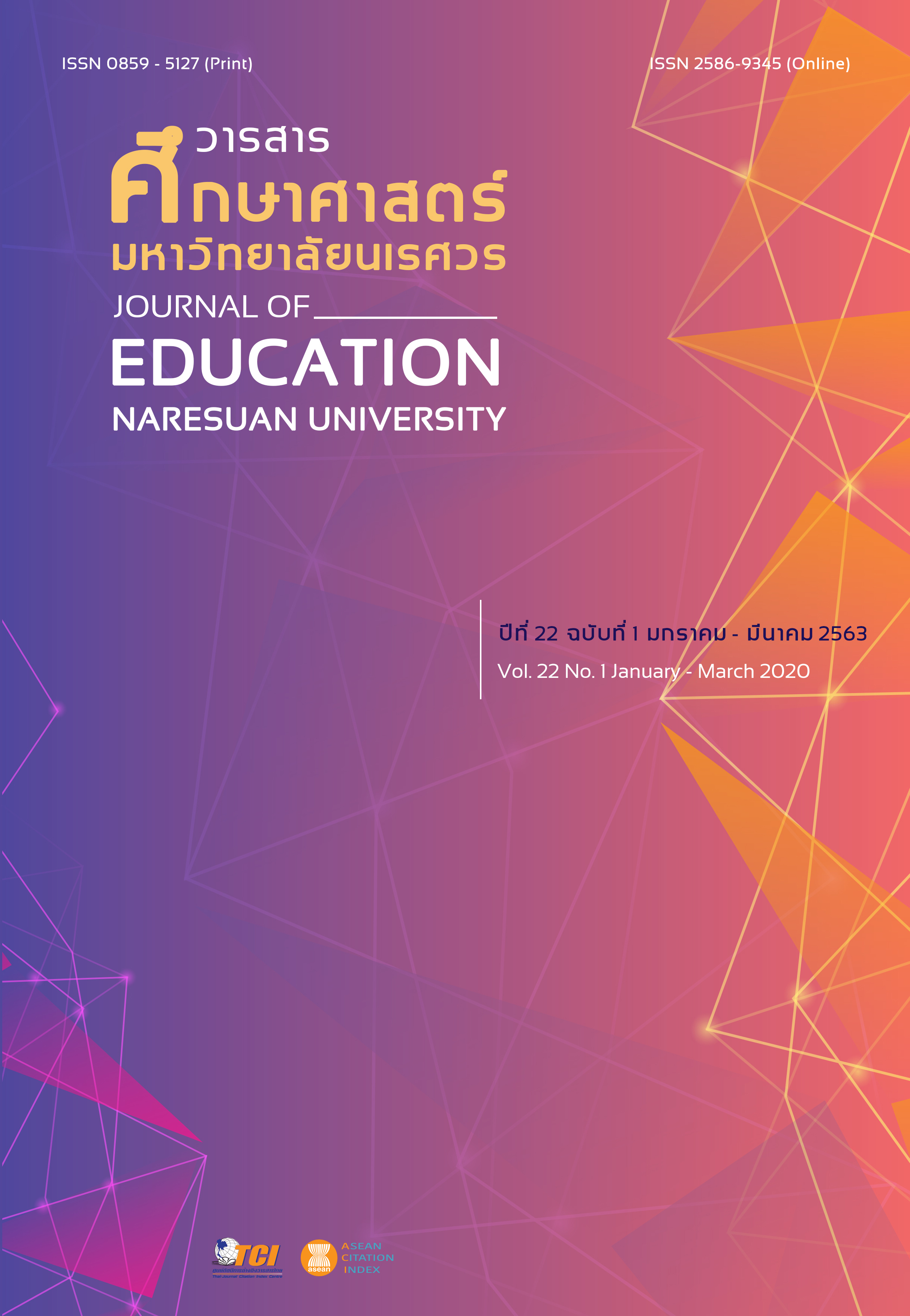ว่าด้วยธรรมชาติของสมมติฐานทางวิทยาศาสตร์ และการนำไปใช้ในการจัดการเรียนการสอนวิทยาศาสตร์
Main Article Content
บทคัดย่อ
บทความนี้นำเสนอธรรมชาติของสมมติฐานทางวิทยาศาสตร์ ซึ่งมีบทบาทสำคัญในกระบวนการสืบเสาะทางวิทยาศาสตร์ แต่ได้รับความสนใจไม่มากนักในวงการวิทยาศาสตร์ศึกษา โดยเฉพาะในประเทศไทย บทความมุ่งนำเสนอว่า สมมติฐานทางวิทยาศาสตร์มีได้หลากหลายประเภท ได้แก่ สมมติฐานเชิงบรรยาย สมมติฐานเชิงอธิบาย และสมมติฐานเชิงกระบวนการ แต่หลายคนมักเข้าใจว่า สมมติฐานเป็นการพยากรณ์ผลที่จะเกิดขึ้น ดังนั้น บทความจึงเสนอว่า นักเรียนควรเข้าใจธรรมชาติของสมมติฐานทางวิทยาศาสตร์ และฝึกตั้งสมมติฐานทางวิทยาศาสตร์ ซึ่งครูสามารถส่งเสริมได้ด้วยกลวิธีต่างๆ โดยเฉพาะการให้เหตุผลแบบจารนัย
Article Details
เจ้าของบทความมิได้คัดลอก หรือละเมิดลิขสิทธิ์ของผู้ใด หากเกิดการละเมิดลิขสิทธิ์ ไม่ว่าวิธีใด หรือการฟ้องร้องไม่ว่ากรณีใด ๆ ที่อาจเกิดขึ้นได้ กองบรรณาธิการวารสารศึกษาศาสตร์ ไม่มีส่วนเกี่ยวข้องทั้งสิ้น ให้เป็นสิทธิ์ของเจ้าของบทความที่จะดำเนินการ
เอกสารอ้างอิง
Abd-El-Khalick, F., Boujaoude, S., Duschl, P., Lederman, N. G., Mamlok-Naaman, R., Hofstein, A., Nias, M., Treagust, D., & Tuan, H. (2014). Inquiry in science education: International perspectives. Science Education, 88(3), 397-419.
Baxter, L. M., & Kurtz, M. J. (2001). When a hypothesis is not an educated guess. Science and Children, 38(7), 18-20.
Bureau of Academic Affairs and Educational Standards. (2010). Indicators and core learning content in science according to the Basic Education Core Curriculum B.E. 2551. Bangkok: Agricultural Co-operative Federation of Thailand. [in Thai]
Eastwell, P. (2014). Understanding hypotheses, predictions, laws, and theories. Science Education Review, 31(1), 16-21.
Giere, R. N. (1983). Testing theoretical hypotheses. Minneapolis: University of Minnesota. Retrieved from the University of Minnesota Digital Conservancy, https://hdl.handle.net/11299/185344
Guisasola, J., Ceberio, M., & Zubimendi, J. L. (2006). University Students’ Strategies for Constructing Hypothesis When Tackling Paper-and-Pencil Tasks in Physics. Research in Science Education, 36(3), 163-186.
Gyllenpalm, J., & Wickman, P. O. (2011). The uses of the term hypothesis and the inquiry emphasis conflation in science teacher education. International Journal of Science Education, 33(14), 1993-2015.
Hempel, C. G. (1965). Aspects of scientific explanation and other essays in the philosophy of science. New York: The Free Press.
Johnston, J. S. (2009). What does the skill of observation look like in young children? International Journal of Science Education, 31(18), 2511-2525.
Kim, H. J., & Pedersen, S. (2011). Advancing young adolescents’ hypothesis-development performance in a computer-supported and problem-based learning environment. Computer and Education, 57(2), 1780-1789.
Kim, M., Jung, Y. J., & Yoon, H. (2012). Stories of teaching hypothesis-verification process in elementary science classrooms. In K. C. D. Tan and M. Kim (Eds.). Issues and Challenges in Science Education Research: Moving Forward (pp. 175-189). Dordrecht: Springer.
Kwon, Y., Jeong, J., & Park, Y. (2006). Roles of abductive reasoning and prior belief in children’s generation of hypotheses about pendulum motion. Science and Education, 15(6), 643-656.
Ladachart, L., & Ladachart, L. (2016). Pre-service biology teachers’ understandings about nature of scientific inquiry. Journal of Learning Innovations Walailak University, 2(1), 24-44. [in Thai]
Ladachart, L., & Ladachart, L. (2017). From 5Es inquiry cycle towards theory-directed inquiry. Journal of Research Unit on Science, Technology and Environment for Learning, 8(2), 436-448. [in Thai]
Ladachart, L., & Ladachart, L. (2018). From scientific literacy and inquiry to stem education and design. Journal of Education Naresuan University, 20(1), 246-260. [in Thai]
Ladachart, L., & Mahalee, K. (2016). Lower-secondary School Students’ Understandings about Nature of Scientific Inquiry. Journal of Research Unit on Science, Technology and Environment for Learning, 7(2), 284-310. [in Thai]
McComas, W. F. (1998). The principal elements of the nature of science: Dispelling the myths. In W. F. McComas (Ed.). The Nature of Science in Science Education: Rationales and Strategies (pp. 53-70). The Netherlands: Kluwer Academic Publishers.
Oh, P. S. (2010). How can teachers help students formulate scientific hypotheses? some strategies found in abductive inquiry activities of earth science. International Journal of Science Education, 32(4), 541-560.
Okasha, S. (2002). Philosophy of science: A very short introduction (C. Chanthamrong, Trans.). Bangkok: The Princess Maha Chakri Sirindhorn Anthropology Centre.
Park, J. (2006). Modelling analysis of students’ processes of generating scientific explanatory hypotheses. International Journal of Science Education, 28(5), 469-489.
Quinn, M. E., & George, K. D. (1975). Teaching hypothesis formation. Science Education, 59(3), 289-296.
Walton, D. N. (2001). Abductive, presumptive and plausible arguments. Informal Logic, 21(2), 141-169.
Wenham, M. (1993). The nature and role of hypotheses in school science investigations. International Journal of Science Education, 15(3), 231-240.
Yoon, H. G., Joung, Y., J., & Kim, M. (2012). The challenge of science inquiry teaching for pre-service teachers in elementary classrooms: Difficulties on and under the scene. Research in Science Education, 42(3), 589-608.


